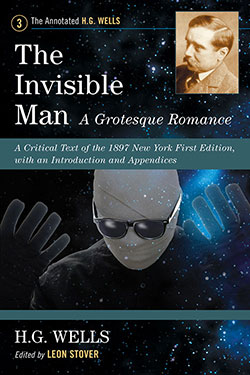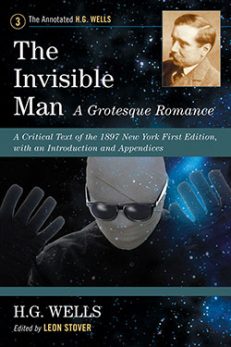The Invisible Man: A Grotesque Romance
A Critical Text of the 1897 New York First Edition, with an Introduction and Appendices
$29.95
In stock
About the Book
H.G. Wells barely revised The Invisible Man once it was published, adding only an epilogue. But the opening statement of that epilogue—“So ends the strange and evil experiment of the Invisible Man”—has posed challenges to scholars. How to understand it? Does it speak strictly to the scientific elements of the novel? Or is it a part of the work’s political underpinnings? The 1897 New York first edition (the first edition to incorporate the epilogue) is used here as the basis for the exhaustive annotations and other critical apparatus of the world’s foremost Wellsian scholar. The introduction examines in great detail the novel’s position in the Wellsian canon and sets the major themes in context with the literary conventions used in his other works, particularly the scientific romances.
About the Author(s)
Bibliographic Details
H.G. Wells
Format: softcover (6 x 9)
Pages: 251
Bibliographic Info: 1 photo, annotations, appendices, bibliography, index
Copyright Date: 2012 [1998]
pISBN: 978-0-7864-6871-3
Imprint: McFarland
Series: The Annotated H.G. Wells
Table of Contents
Preface ix
Introduction 1
1. The Text 1
2. Science Fiction 2
3. Socialism 3
4. “Dialectic of Human Destiny” 9
5. Invisibility 12
6. “The Cramped Village” 14
7. Laboratory Ethics 17
8. “Holy Terror” 22
The Invisible Man: A Grotesque Romance (1897) 29
(Annotated text of the first New York edition) 32
Appendices
I. Review of The Invisible Man in The Spectator (1897) 205
II. Review of The Invisible Man by Arnold Bennett (1897) 207
III. Sergei Nechaev, “The Revolutionary Catechism” (1869), Section 1 209
IV. T.H. Huxley, “Science and Culture” (1880), Excerpt 212
V. Thomas Carlyle, Past and Present, “The Sphinx” (1843) 218
Bibliography 227
Index 237
Book Reviews & Awards
“Wells’s masterpieces get the red-carpet treatment here in these luxurious editions…academic collections supporting English departments should definitely invest in this volume”—Library Journal; “Stover is to be thanked for his years of Wellsian scholarship”—Public Library Quarterly; “Stover, by presenting the intellectual underpinnings of Wells’ work, has provided a powerful tool for understanding his writings, one sees them more deeply, without losing that earlier sense-of-wonder that originally opened the vistas of the young reader’s mind…a crucial guide to these classics of science fiction”—Fosfax; “two cheers for Stoverism…formidable scholarship…serious students of Wells would be foolish to ignore ‘Stoverism’”—The Wellsian; “Stover should be commended for a painstaking and meticulous editorial commentary”—Utopian Studies; “extensively annotated and analyzed by Stover…annotations are filled with insights into Wells’ writings and philosophy”—C&RL News.





